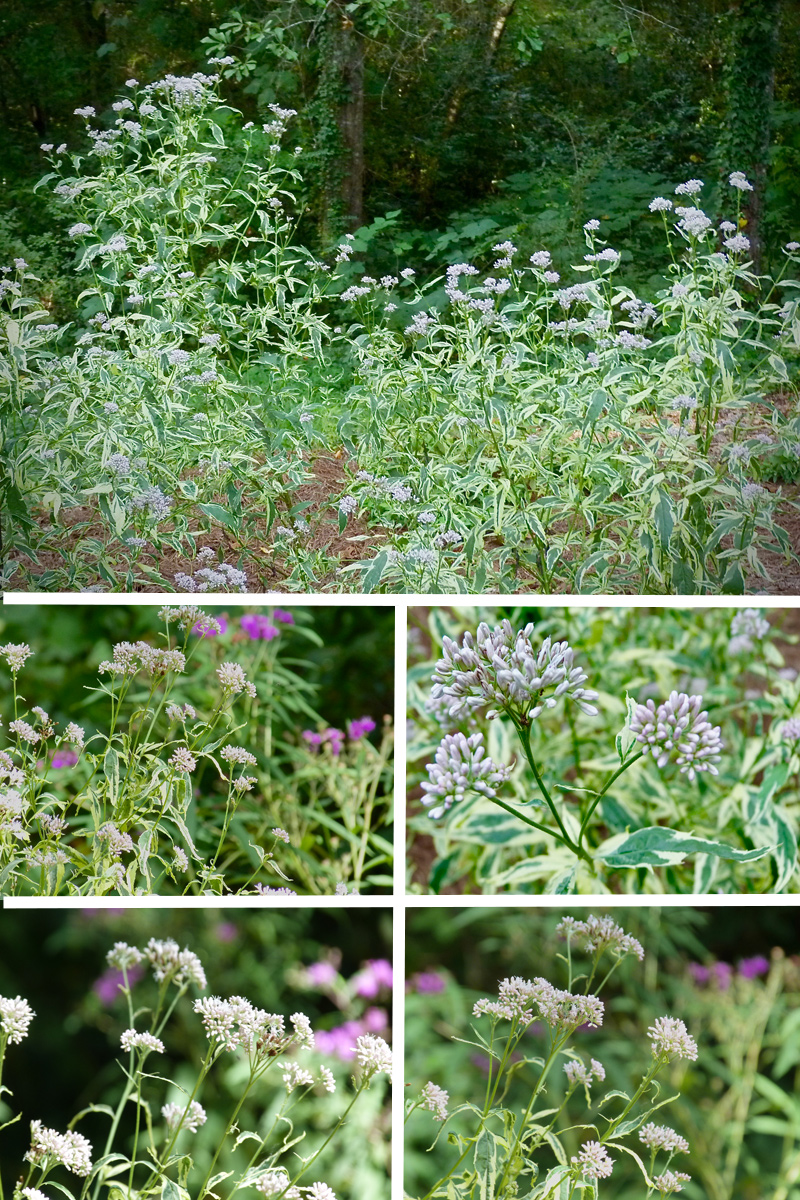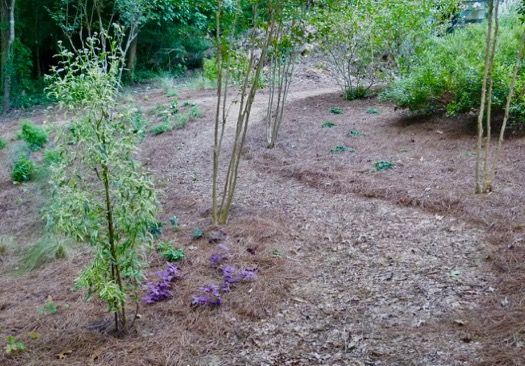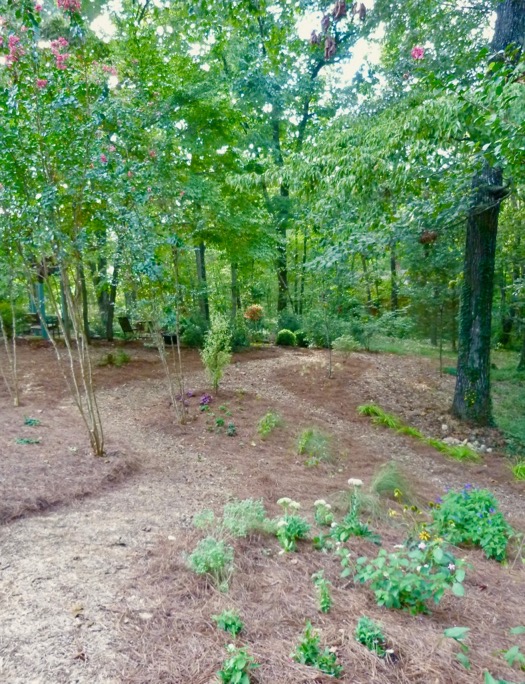Gardener Gone Wild: My New Pollinator Garden
 Sunday, September 9, 2018 at 8:30PM
Sunday, September 9, 2018 at 8:30PM  Thread Waisted Wasp on Variegated Joe Pye Weed.I have been eyeing the large untamed space beyond the arbor garden for years, thinking I may eventually get around to landscaping the area. In a moment of madness and inspired by an unusual cool summer day, I began the project about a month ago. Undaunted by the resumption of high temps and humidity, I purchased a few plants to inspire me.
Thread Waisted Wasp on Variegated Joe Pye Weed.I have been eyeing the large untamed space beyond the arbor garden for years, thinking I may eventually get around to landscaping the area. In a moment of madness and inspired by an unusual cool summer day, I began the project about a month ago. Undaunted by the resumption of high temps and humidity, I purchased a few plants to inspire me.  Variegated Joe Pye Weed, Eupatorium fortune 'Pink Frost', was one of the first plants I bought for the new pollinator garden.
Variegated Joe Pye Weed, Eupatorium fortune 'Pink Frost', was one of the first plants I bought for the new pollinator garden.
 Then I began working like a wild woman. I sprayed glyphosate over the thick layer of vines and other weeds that covered the soil. When most of them were dead, I spread pine straw to define planting beds and winding paths.
Then I began working like a wild woman. I sprayed glyphosate over the thick layer of vines and other weeds that covered the soil. When most of them were dead, I spread pine straw to define planting beds and winding paths.  One entrance to the pollinator garden is through the arbor garden seen here in the background. That's another 'Pink Frost' Joe Pye Weed on the left.By night, I studied garden books, magazines and websites for guidance. By day, I dug and and planted. I was pleasantly surprised by the nice loamy soil that hid under the weeds. I remembered that over half a century ago, this was a working farm. Perhaps cattle roamed the area, or maybe vegetables grew here.
One entrance to the pollinator garden is through the arbor garden seen here in the background. That's another 'Pink Frost' Joe Pye Weed on the left.By night, I studied garden books, magazines and websites for guidance. By day, I dug and and planted. I was pleasantly surprised by the nice loamy soil that hid under the weeds. I remembered that over half a century ago, this was a working farm. Perhaps cattle roamed the area, or maybe vegetables grew here.
OK. I worked that out of me. I am not finished yet; I still have to mulch the paths and put in more plantings, especially those that bloom in spring and early summer. But I have accomplished enough that you can get an idea of what it will look like - if you have an imagination! I am calling this my pollinator garden, because many of the plants are friendly to butterflies and bees. Little Sulfur butterfly on a perennial lantana.
Little Sulfur butterfly on a perennial lantana.
 This bumble bee has pollen baskets tightly packed with pollen it has gathered from Giant Ironweed, Veronia gigantea.
This bumble bee has pollen baskets tightly packed with pollen it has gathered from Giant Ironweed, Veronia gigantea.
 I am limited somewhat, because trees that surround the area prevent plants from receiving full sun. Most plants I am using will do well in sun to partial shade. Sometimes plants that need full sun farther north will grow and bloom here with some shade because of our intense summer heat.
I am limited somewhat, because trees that surround the area prevent plants from receiving full sun. Most plants I am using will do well in sun to partial shade. Sometimes plants that need full sun farther north will grow and bloom here with some shade because of our intense summer heat.
The place is in the "little dot" stage now. I am drawn to plants that have the word "weed" or "wild" attached to their common names: Joe Pye Weed, Iron Weed, Wild Ageratum. I hope they are tough and that they will fill out and spread like their names suggest!
Here are some more images taken in my new pollinator garden. The paths will be better defined when I add mulch, which will also help suppress weeds.


 Some flowers in the pollinator garden that are currently blooming, clockwise from top left: Iron Weed; Solidago 'Sweety', a dwarf goldenrod; Salvia 'Black and Blue'; Sedum 'Autumn Joy.'
Some flowers in the pollinator garden that are currently blooming, clockwise from top left: Iron Weed; Solidago 'Sweety', a dwarf goldenrod; Salvia 'Black and Blue'; Sedum 'Autumn Joy.'
Other plants, not previously mentioned in this post, in the pollinator garden:
Campanula
Carex
Catmint
Cranesbill (perennial geranium)
Daylily
Echinacea
Euphorbia
Pink Muhly Grass
Platycodon
Purple Oxalis
Yarrow
Creeping Fig, as a ground cover along one side of the pollinator garden
Lorepetalum 'Emerald Snow', a semi-dwarf with white blooms, planted on back edge for structure
Spirea 'Candy Corn', noted for its colorful foliage as well as spring blooms, also on back edge for structure
That's it for now, but much more to come! I am excited that some things are already blooming, but the real test will be how things look in year three. Always hopeful! Deb
